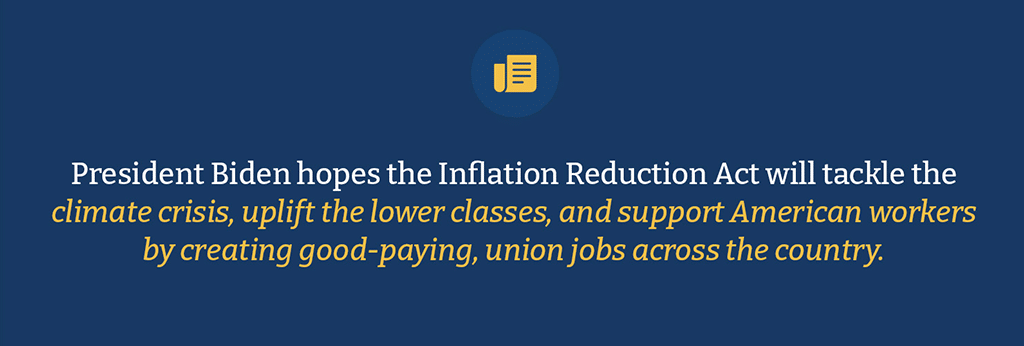On August 16, President Biden signed the Inflation Reduction Act of 2022 into law.
This comprehensive bill targets making health care and prescription drugs more affordable, fighting climate change, taxing wealthy corporations, and more funding for the IRS.
Although the President has signed this bill, some savings in the bill won’t kick in right away. For example, efforts to lower drug prices, including caps on their costs for seniors, won’t take effect until 2025. Studies have also shown the bill won’t reduce inflation, but others argue it will. Only time will tell.
Pivotal items in this legislation include:
- The creation of a 15% corporate minimum tax rate: Corporations with at least $1 billion in income will have a new tax rate of 15%. Taxes on individuals will not be increased, and stock buybacks by corporations will have a 1% excise tax.
- Prescription drug price reform: Medicare will be allowed to negotiate the price of certain prescription drugs, bringing down the price recipients will pay for their medications. Starting in 2025, Medicare receivers will have a $2,000 cap on annual out-of-pocket prescription drug costs.
- IRS tax enforcement: For several years the IRS has declared they are understaffed and funded poorly, making it impossible to operate at full capacity.The bill invests $80 billion in the IRS over the next 10 years, allowing them to upgrade their systems and adequately staff their offices for resolving taxpayer issues.
- The IRS commissioner has pledged not to use the extra funding to audit small business or lower income taxpayers who earn less than $400,000. He noted that other resources would be invested in hiring, training, and IT systems that will allow the agency to better serve all taxpayers.
- Affordable Care Act (ACA) subsidy extension: Currently, medical insurance premiums under the ACA are subsidized by the federal government to lower premiums. These subsidies, which were scheduled to expire at the end of this year, will be extended through 2025.
- Energy security and climate change investments: The bill includes numerous investments in climate protection, including tax credits for households to offset energy costs, investments in clean energy production, and tax credits aimed at reducing carbon emissions.
By signing this bill into law, President Biden hopes the Inflation Reduction Act will tackle the climate crisis, uplift the lower classes, and support American workers by creating good-paying, union jobs across the country.

